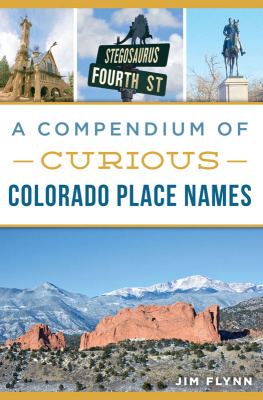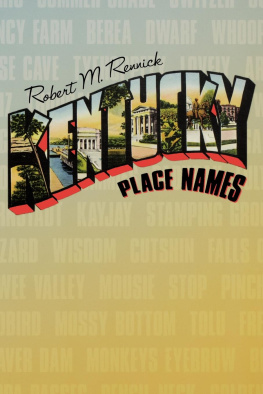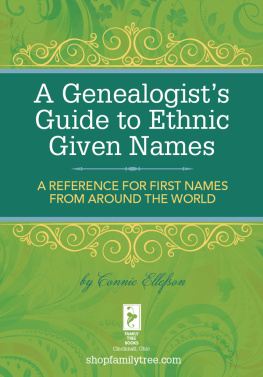1500
CALIFORNIA
Place Names
Their Origin and Meaning
A revised version of 1000 California Place Names,
by Erwin G. Gudde, third edition
William Bright

University of California Press
Berkeley and Los Angeles, California
University of California Press, Ltd.
London, England
1998 by The Regents of the University of California
Library of Congress Cataloging-in-Publication Data
Bright, William, 1928
1500 California place names : their origin and
meaning / William Bright.
p. cm.
A revised version of 1000 California place names, by Erwin G. Gudde, third edition.
ISBN 0-520-21271-1 (alk. paper)
1. Names, GeographicalCalifornia.
2. CaliforniaHistory, Local. I. Gudde, Erwin Gustav, 18891969. 1000 California place names II. Title. III. Title: 1500 California place names. IV. Title: Fifteen hundred California place names.
F859. G8 1998
917.94 001 4 dc21
97-43147
Printed in the United States of America
11 10 09 08 07 06 05 04
12 11 10 9 8 7 6 5 4
The paper used in this publication meets the minimum requirements of ANSI/NISO Z39.48-1992 (R1997) (Permanence of Paper). 
1500
California Place Names


Preface

THIS BOOK IS the descendant of several others. In 1947, the University of California Press published a small book called 1000 California Place Names, by Professor Erwin G. Gudde, of the University of California at Berkeley. In 1949, the Press published a larger volume, reporting in full on Guddes place-name research up to that time; the title of that work was California Place Names: The Origin and Etymology of Current Geographical Names. The success of both those books warranted updated versions in the following years: second and third editions of the small book were published in 1949 and 1971, while a second edition of the big book appeared in 1960, and a third in 1969the year of Guddes death. Most recently, I have myself carried out a new updating of Guddes big book, which will appear as a revised fourth edition in 1998, with Gudde named as author and myself as editor. A special effort was made in this new edition not only to incorporate fresh data on California place names in general, but also to give more reliable information on names of Native American origin, based on recent field research by linguists and anthropologists working with living speakers of California Indian languages.
In preparing a new small book, the present 1500 California Place Names, I wanted to produce a book on California place-name origins that, like Guddes 1000 California Place Names, would be attractive to Californians and convenient to use. For this reason, the book is restricted to two classes of names: first, those that are famous because they refer to well-known geographical features of the state, like San Diego, Tahoe, and Yreka; and second, those that may refer to lesser-known locations but are of interest because of their problematic origins, especially when they derive from Spanishnames like Arrastre, Bodega, and Chamisalor from American Indian languagesnames like Chirpchatter, Loleta, and Cuyamaca. (A few names have gone through both Indian and Spanish versions; in Santa Barbara County, the Chumash name kalawashaq, meaning turtle shell, was reinterpreted as Spanish calabazal, pumpkin patch, before entering English as the name of Calabazal Creek.) For the large number of names that fall in the middleplaces like Johnsondale and Johnstonville and Johnsvillereaders are directed to the fourth edition of the big book, California Place Names.
In addition to place names, this book also includes names of the major Indian tribes of California. Some of these have themselves been adapted as place names, and others are referred to as the sources of place names.
I should make it clear that 1500 California Place Names is not simply an expansion of the earlier small book; rather, it is a new work, based on the information that I gathered for the larger work. Of course I am indebted, above all, to the earlier work by Gudde; but in addition I must express my gratitude to the many people who provided new information when I was carrying out that revision. One group consists of several dozen local historians, authors, government employees, teachers, librarians, and knowledgeable California residents; I have thanked them by name in the larger volume. A second group consists of my fellow specialists in California Indian languages, and I wish to repeat my thanks to the following scholars in particular: Catherine Callaghan, Catherine Fowler, Victor Golla, Margaret Langdon, John McLaughlin, Pamela Munro, Robert Oswalt, Alice Shepherd, and William Shipley. Responsibility for all use of published or unpublished material is, of course, mine alone.
I have tried to provide information on the local pronunciations of place names, employing a system of phonetic transcription familiar from most English dictionaries. However, it is often difficult to fix upon a single correct pronunciation. In California and the Southwest, this problem arises especially with regard to names of Spanish origin. The word caada, valley, is pronounced in Spanish approximately as kahn YAH dhah, but such an utterance is rarely heard among Californians who are speaking English. What one hears, of course, is a range of pronunciations, including kuhn YAH duh, kuhn YAD uh, kuh NAH duh, and KAN uh duh; and all these must be recognized. None are incorrect, but they are used by people with different social backgrounds and attitudesconservative or innovative, Anglo oriented or Hispano oriented. By contrast, a conceivable pronunciation like kuh NAY duh simply does not occur among local residents; it could be used only by the greenest newcomer.
With regard to Native American origins of place names, it has to be acknowledged that some are not fully understood and are likely to remain forever obscureespecially in the long-missionized southern and central areas of California. Many of the original languages are no longer spoken, and the cultures have dwindled. But the California Indian people are still our neighbors, and we live on sites that were founded by their ancestors. The names that those ancestors gave to California places are still on our tongues.
William Bright
Boulder, Colorado
August 1997
Key to Pronunciation

THE PRONUNCIATION of many California place names is obvious from their spelling. In other cases, however, this book indicates pronunciations phonetically within parentheses. Note the values of the following symbols:
Next page











